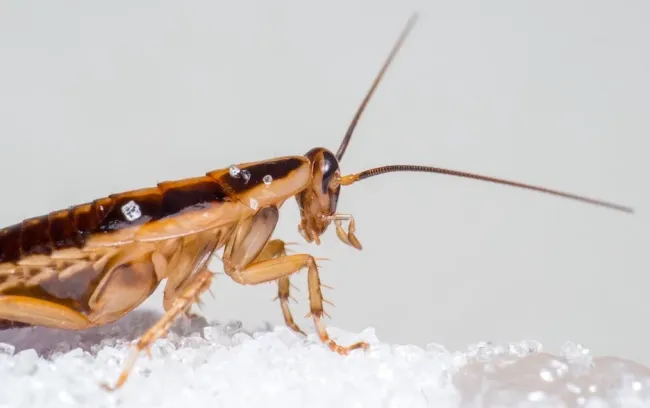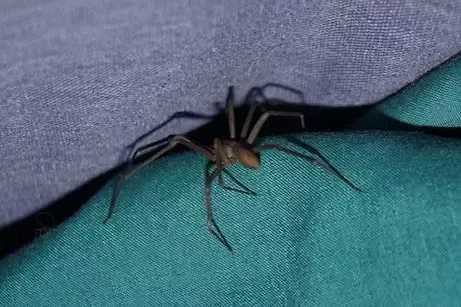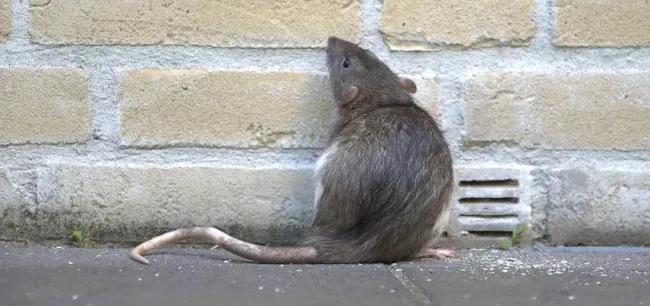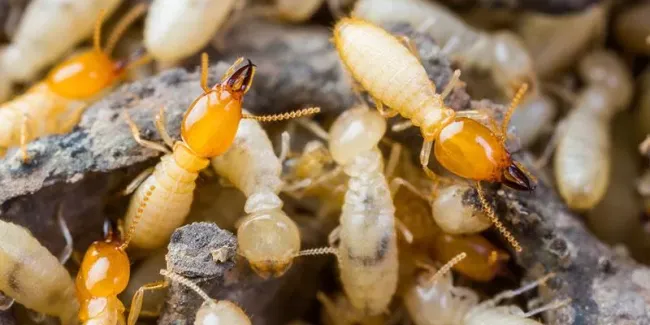Common Household Pests in Pittsburgh, Pennsylvania
Most people are surprised to learn that every season is pest season in Pittsburgh. In the warmer months conditions are perfect for insects and animals to thrive outdoors and in the cooler and cold months our homes offer a warm space for them to seek shelter. The pests that typically invade Pennsylvania homes include:
- Ants
- Cockroaches
- Spiders
- Rodents
- Termites

A line of ants marching in your home can give you a sinking feeling. You need to be diligent to make sure you eliminate every last member of the colony, queen included, in order to exterminate them effectively. The dangers of ant infestations include health risks from bites, that they are an attractive snack for other pests, and damage to your home, specifically from carpenter ants, and to a lesser degree, acrobat ants.
Odorous House Ants
These small, brown ants get their name from the unpleasant odor they emit when crushed. They nest pretty much anywhere they can find a crack, crevice, or hole and forage for food near water sources. They don’t cause damage to your home, but can be very annoying.
Pavement Ants
Small, with a black head and thorax, but a light colored abdomen, these ants typically nest near driveways and sidewalks and colonies may have multiple queens. Their only purpose for entering your home is to forage for food, especially those containing sugar and protein. Again, there is no risk of damage to your home.
Acrobat Ants
Often mistaken for carpenter ants, this species is smaller in size and likes to nest in moist wood that has already been damaged. Their name comes from their defensive stance in which they raise their abdomen over their head. They also enjoy sweet and protein rich foods, but have been known to strip the insulation from wiring in homes. Any existing structural damage is made worse with their presence.
Carpenter Ants
These ants are the most destructive of those you’d typically find in your home. They are black in color and can be up to 1” long and each colony has multiple queens, increasing the difficulty of elimination. Their preferred nesting areas are moist wood, including kitchens, bathrooms, entry points, and inside the walls of your home.
How to Get Rid of Ants
Compared to other pests, ants can be relatively easy to remove from your home in most cases. Most DIY bug sprays are ineffective against ants and contain toxic chemicals that can harm your family and pets. Following the steps below can reduce or eliminate an ant infestation in your home.
- Eliminate food temptations by keeping your kitchen clean, wiping up crumbs and spills immediately, and storing food in airtight containers.
- Fix moisture sources and rotted wood to reduce the likelihood of acrobat and carpenter ant colonies moving in.
- Set ant baits in high ant traffic areas, while keeping them away from children and pets, to reduce colony populations.
- Don’t hesitate to contact an experienced pest control professional if there are multiple colonies or you need assistance getting your ant infestation under control using eco and family-friendly products. D-Bug is here to help!

Your first thought of where cockroaches are found is a dirty, unlit room or kitchen, scurrying across the floor from one hiding spot to another. Although they prefer to stay in the dark, which is why many sightings are at night, they are attracted to warmth and readily available food sources. They are known to carry disease-causing pathogens which cause food poisoning and trigger asthma attacks. The varieties most often found in Pittsburgh are:
German Cockroach
This is the most common cockroach in the world. They live about 12 months and reproduce faster than any other roach with the number of eggs they lay. They are light brown to almost black in color and small enough to fit into tight spaces. They prefer warm, humid environments like your kitchen and bathroom.
Oriental Cockroach
These dark-brown or black insects only live up to 6 months. They are found in moist places, such as sewers, sinks, and drains, and their preferred food is decaying organic matter. Their eggs are found in hard to reach places, which can lead to the need for aggressive treatments to control them.
American Cockroach
These pests are the largest cockroaches found in homes, are a reddish-brown to brown color and have light yellow bands behind their heads. They live for up to 2 years and gravitate to stored food.
How to Get Rid of Cockroaches
Usually by the time you notice a cockroach infestation, it is firmly entrenched and may be difficult to resolve without calling in a professional pest control company. However, there are actions you can take to help mitigate the problem, such as:
- Sealing up cracks, including between cabinets, baseboards,
- Removing access to food sources, including trash, open containers, crumbs, and pet food.
- Eliminating all standing water sources by fixing leaks, cleaning drains, and mopping up any spills.
- Setting out glue strips, traps, and baits to assess how severe your infestation is and determine if you need to call in professional reinforcements.

Spiders have a bad rap, but their job in nature is to help keep the pest population under control. Very few inject enough venom to be life-threatening to a human, with the exception of the black widow and brown recluse spiders. People's reactions to them range from a simple dislike of spiders to deep seated fear that can be crippling. The main reason spiders venture into our homes is to feed on insects that can be found there.
The most commonly seen spiders in the Pittsburgh area are:
House Spider
This is the most common spider that is seen indoors in Pennsylvania. They are light gray and usually less than ¼” in size. There is venom in the house spider’s bite, however, it doesn’t cause serious issues, just painfulness that can last up to 16 hours.
Cellar Spider (Daddy Long Legs)
Although these spiders look terrifying with their unproportionally long, spindly legs, they do not make any venom, or pose a danger to humans. They construct multi-layered webs that are difficult to miss.
Brown Recluse Spider
This spider is between ¼” to 1” in width, brown, and has a distinctive violin shaped marking on its head. Its bite is often not painful, but can have very serious consequences, including sickness, convulsions, tissue death around the bite, and more. Medical attention after a brown recluse bite is highly recommended.
Wolf Spider
Known for the thick coat of fine hair on its body, this spider is between 1” and 1.5” across, and can be from brown to gray in color. Although they release venom when they bite, humans typically only experience short-lived pain and redness at the site.
How to Get Rid of Spiders
Although hitting spiders with a shoe (preferably someone else’s) is a tried and true method of elimination, that only takes care of the spider at hand. Many readily available sprays contain chemicals that are toxic to your family and pets, especially if accidentally ingested. It pays to hire an experienced pest control company to eliminate more than a handful of spiders, as they will do a more thorough job using eco- and family-friendly treatments.
Steps to minimize a spider invasion in the first place include:
- Regularly vacuuming, dusting, and removing webs to eliminate spiders and their eggs before they multiply.
- Organizing your home to eliminate clutter.
- Sealing around windows, doors, and other openings to keep spiders outside.
- Not stacking firewood or keeping trash bins and other items against your exterior walls. These are areas in which spiders like to hide.
- Using preventative pest control to reduce potential spider food sources.

Rodents in Pittsburgh
As the weather grows colder, many creatures are looking for a warm place like your home to spend the winter, including rats and mice. They may look cute, but don’t be fooled, they are not good houseguests. The most common invaders in the Pittsburgh area are the house mouse, the deer mouse, the roof rat, and the Norway rat. Each have slightly different behaviors, but they all create havoc by:
- Transmitting serious diseases, such as Hantavirus and Leptospirosis, sometimes without physical contact.
- Destroying your home with their constant gnawing through everything, including walls, support beams, live electrical wires, food containers, and more.
- Leaving feces and urine everywhere they go.
- Contaminating your food.
- Bringing in other pests, such as fleas and ticks.
How to Get Rid of Rodents
Once you have a rodent infestation, it’s in your best interest to deal with it quickly, as rats and mice multiply at an alarming rate. It is recommended that you avoid poison. Not only do you run the risk of accidental ingestion by children and pets, but by the time it kills the vermin, they could be hidden inside your walls. Decomposing animal bodies do not smell pleasant and you may have to cut through baseboards or drywall to remove them.
Although you can deal with a rodent infestation yourself, it is a long and involved process that involves the dirty work of emptying traps and close contact with the critters. When you partner with a professional rodent exterminator, they will:
- Perform a detailed inspection of your home to assess where the rodents are hiding and how they got in.
- Set, empty, and reset traps as needed.
- Expertly place and monitor enclosed bait stations, which restrict access to rodents only.
- Identify and recommend exclusion work to prevent future entry.
Once rodents are gone, you can prevent new infestations by keeping food, including pet food, out of reach and making sure all possible entry points are sealed. Mice only need a hole the size of a dime to squeeze their way into your home.

Termites in Pittsburgh
A termite infestation is bad news. In most cases, termites aren’t discovered until they have caused thousands of dollars of damage, most of which isn’t covered by insurance. They will eat through all organic material in your home, including structural support beams, at a rate of up to a pound of wood a day, depending on the size of the colony.
Based on the Termite Infestation Probability Zone (TIP Zone) map, Pittsburgh is in TIP Zone #2, which indicates a moderate to heavy probability of termite infestation when no preventative termite control measures are in use. In our area, the subterranean termite is the most likely culprit. These ravenous insects live in colonies that have anywhere from 60,000 to 2 million worker termites alone.
How to Get Rid of Termites
The best way to eliminate termites is to not let them into your home in the first place! To that end, here are a few tips to reduce the risk of termites finding their way in..
- Keep trees, shrubs, mulch stacked firewood and other materials away from your home.
- Reduce the amount of moisture in contact with your foundation with proper grading and downspout placement.
- Remove dead trees and stumps from your property to eliminate food sources.
- Schedule an annual termite inspection with professional exterminators to catch an infestation as early as possible.
- Consider professional preventive termite control treatments to eliminate termites from your property before they reach your home.
Should termites find their way in despite your best efforts, don’t waste your time with DIY termite control. Contact a company with qualified termite exterminators to reliably and effectively get rid of the termites in your home. They will use liquid barrier treatments, bait stations, or a combination to eliminate termites.
Need Help Eliminating Household Pests in Pittsburgh? D-Bug is Here to Help!
The expert exterminators in Pittsburgh at D-Bug Pest Control have the knowledge and equipment to solve all of your household pest issues, no matter how big or how small they are. We have been protecting homes in the local community for over 80 years. Our state licensed and Quality Pro certified exterminators are continuously improving and developing new techniques to provide you with the best service possible. If you are having issues with household pests, bed bugs, rodents, or more, contact us today to take back your home from the invaders.

